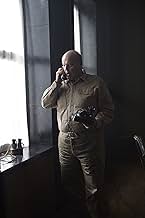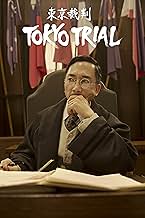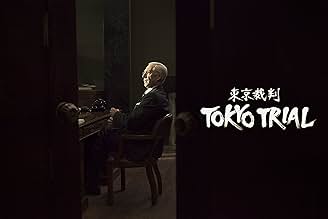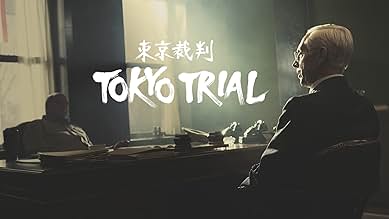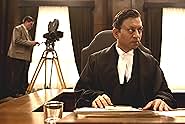Tokyo Trial
- Mini-série télévisée
- 2016
- 50min
NOTE IMDb
7,3/10
2,1 k
MA NOTE
Ajouter une intrigue dans votre langueA historical drama that focuses on a decade-long investigation into events in the Pacific during and after WWII.A historical drama that focuses on a decade-long investigation into events in the Pacific during and after WWII.A historical drama that focuses on a decade-long investigation into events in the Pacific during and after WWII.
- Récompenses
- 1 victoire et 1 nomination au total
Parcourir les épisodes
Avis à la une
This is one of the finest courtroom dramas after 12 Angry Men. There is never over the top sentimental (or) emotional narrative despite the subject taken is highly sensitive. This is exactly how judges go about and come to their conclusion inspite of political interference. Fanstically made series based on true history!! Must watch for every Management aspirants!
Not for the impatient, this 4 part series is designed for viewers who are willing to listen to everything that is said.
Ideas about atrocities, crimes against humanity, and what is acceptable in war-making are presented throughout. Always in the background: the Nuremberg Trials and how posterity will view the trial and the judges.
Production values are top-notch but never over the top. There's a very clever interpolation of actual courtroom newsreel footage with scenes from this show -- very good set and color matching.
This is a show about ideas and about how the winners view morality and their roles in defining what is and is not acceptable in warfare.
Recommended.
Ideas about atrocities, crimes against humanity, and what is acceptable in war-making are presented throughout. Always in the background: the Nuremberg Trials and how posterity will view the trial and the judges.
Production values are top-notch but never over the top. There's a very clever interpolation of actual courtroom newsreel footage with scenes from this show -- very good set and color matching.
This is a show about ideas and about how the winners view morality and their roles in defining what is and is not acceptable in warfare.
Recommended.
Far less remembered than the Nuremberg trials, the Tokyo Trials were nonetheless a turning point in Asian history. This series brilliantly brings out the factors at play during the trial, not least the Colonial history of the Allies.
All characters are thoughtfully portrayed and excellently played, but it's Irrfan Khan as justice Pal who provides the philosophical backbone to the story. He's a last minute addition from India because the Allies wanted some (token) Asians, but ironically India was then still a British colony. The proud Philippine judge, the questioning Dutchman, the British judge who still has a case of colonial hangover: these traits are portrayed through nuance rather than caricature.
Asia still lives in the aftermath of the wounds that the war opened. While the trials drew a line under one traumatic incident, what has followed in the 80 years since almost directly follows those events.
I'm thankful for the show being made and for exploring dissenting opinions. In a time where infantile soaps like Stranger Things are the norm on Netflix, this series was a delight, and it should be to anyone interested in history in general, and Asian history in particular.
All characters are thoughtfully portrayed and excellently played, but it's Irrfan Khan as justice Pal who provides the philosophical backbone to the story. He's a last minute addition from India because the Allies wanted some (token) Asians, but ironically India was then still a British colony. The proud Philippine judge, the questioning Dutchman, the British judge who still has a case of colonial hangover: these traits are portrayed through nuance rather than caricature.
Asia still lives in the aftermath of the wounds that the war opened. While the trials drew a line under one traumatic incident, what has followed in the 80 years since almost directly follows those events.
I'm thankful for the show being made and for exploring dissenting opinions. In a time where infantile soaps like Stranger Things are the norm on Netflix, this series was a delight, and it should be to anyone interested in history in general, and Asian history in particular.
10rps-2
With so much mindless fluff on television, how great it is to see a serious and superbly done docudrama. Tokyo Trial covers the legal and political battles that were bitterly fought behind closed doors for two years after the Japanese surrender. The tribunal wrestled with the issue of whether Japanese leaders could be punished for aggression when there really was no law against aggression and whether the Japanese incursion into China was really any different from the British in India or the Americans' genocide of their native population. We are privy to some superb behind the scenes legal discussions. The series exudes honesty and accuracy. It uses one very effective technique. The scenes in the courtroom are shown in newsreel style black and white while the dialogue is heard in the tinny, halting voice of the translator. Most effective! The various judges are brilliantly drawn. Each is a unique personality. The clothing, the accents, even the body language, are all carefully presented and give the series a genuine " slice of the past" quality that few films achieve. I sometimes despair that we use our amazing video technology for trivialities and trash. This series shows what television can accomplish but so seldom does.
This is a fascinating, well made four-part miniseries. I watched it on Netflix over four days, but it's so good, I can see how one might want to binge watch it. It reminded me of Twelve Angry Men.
In 1946, eleven Allied Judges were appointed to The International Military Tribunal for the Far East (IMTFE), aka Tokyo Trial or Tokyo War Crimes Tribunal. Their job was to try twenty-eight Japanese leaders for conventional war crimes and crimes against humanity. I didn't know anything about this trial.
The participating countries were: Australia, Canada, China, France, British India, the Netherlands, New Zealand, the Philippines, the Soviet Union, the United Kingdom, and the United States. Later a twelfth judge from India was added. These dedicated, but very different men, (yep, all men in those days), had legal and moral clashes with regards to how to stay true to the law, remain impartial, and prevent similar atrocities.
This tribunal would form the foundation of how "war as a crime by individuals" would be judged in the future. It had previously existed only part of the Paris Peace Pact of 1928. They ran into a problem with war crimes being ascribed only to a Nation and not to an individual.
There is infighting, cliques, power struggles, and schisms amongst the judges. Pal and Röling are outspoken in their dissent, which created an interesting narrative. Röling is the main protagonist; we get a glimpse into his creative relationship with German pianist Eta Harich-Schneider.
Many of the accused were found guilty, including former Prime Minister Hideki Tojo.
I listed the judges to keep track of them.
In 1946, eleven Allied Judges were appointed to The International Military Tribunal for the Far East (IMTFE), aka Tokyo Trial or Tokyo War Crimes Tribunal. Their job was to try twenty-eight Japanese leaders for conventional war crimes and crimes against humanity. I didn't know anything about this trial.
The participating countries were: Australia, Canada, China, France, British India, the Netherlands, New Zealand, the Philippines, the Soviet Union, the United Kingdom, and the United States. Later a twelfth judge from India was added. These dedicated, but very different men, (yep, all men in those days), had legal and moral clashes with regards to how to stay true to the law, remain impartial, and prevent similar atrocities.
This tribunal would form the foundation of how "war as a crime by individuals" would be judged in the future. It had previously existed only part of the Paris Peace Pact of 1928. They ran into a problem with war crimes being ascribed only to a Nation and not to an individual.
There is infighting, cliques, power struggles, and schisms amongst the judges. Pal and Röling are outspoken in their dissent, which created an interesting narrative. Röling is the main protagonist; we get a glimpse into his creative relationship with German pianist Eta Harich-Schneider.
Many of the accused were found guilty, including former Prime Minister Hideki Tojo.
I listed the judges to keep track of them.
- Tim Ahern as Major General Myron C. Cramer (United States)
- Paul Freeman as The Honourable Lord William D. Patrick (United Kingdom)
- Serge Hazanavicius as Henri Bernard (France)
- Marcel Hensema as Professor Bert V.A. Röling (Netherlands)
- Jonathan Hyde as President Sir William Webb (Australia)
- Irrfan Khan as Radhabinod Pal (India)
- Stephen McHattie as Edward Stuart McDougall (Canada)
- David Tse as Mei Ju-ao (China)
- Julian Wadham as Sir Erima H. Northcroft (New Zealand)
- Bert Matias as Colonel Delfín Jaranilla (Philippines)
- Kestutis Stasys Jakstas as Major General I.M. Zaryanov (Soviet Union)
- William Hope as John P. Higgins (United States)
Le saviez-vous
- AnecdotesAll the furniture in the courtroom, hotel and restaurant sets were custom-built replicas made by the art and construction departments for use on the production in order for everything to look authentic.
- GaffesMajor General Cramer, Judge Advocate General (JAG) of the United States Army, is wearing the Corps of Engineers branch insignia instead of the JAG branch insignia.
- ConnexionsEdited into Tokyo Trial (2017)
Meilleurs choix
Connectez-vous pour évaluer et suivre la liste de favoris afin de recevoir des recommandations personnalisées
- How many seasons does Tokyo Trial have?Alimenté par Alexa
Détails
- Date de sortie
- Pays d’origine
- Site officiel
- Langues
- Aussi connu sous le nom de
- Токийский процесс
- Lieux de tournage
- Didziasalis, Ignalina District Municipality, Lithuanie(Post War Tokyo)
- Sociétés de production
- Voir plus de crédits d'entreprise sur IMDbPro
Contribuer à cette page
Suggérer une modification ou ajouter du contenu manquant



